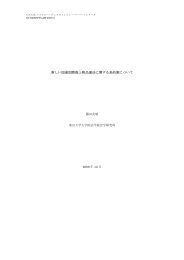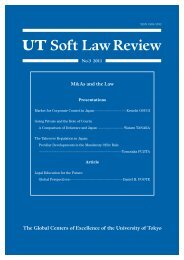UT Soft Law Review
UT Soft Law Review
UT Soft Law Review
You also want an ePaper? Increase the reach of your titles
YUMPU automatically turns print PDFs into web optimized ePapers that Google loves.
<strong>UT</strong> <strong>Soft</strong> <strong>Law</strong> <strong>Review</strong> No.2 2010Kanda: All right. In short, as takeover defenses began to be employed by listedcompapnies in Japan, Japanese people began to discuss only the technical details or specificsof such defense plans. We wondered if it is right. The detailed discussion is like, which kind ofthe shareholders' meeting resolution should be required, special resolution or ordinaryresolution? Does an ordinary resolution have any legal meaning? Or, is it just de factoevidence of what shareholders think? Is it desirable to set up a special committee, and does itlegally have any meaning? Does a special committee’s opinion have a binding force on theboard of directors? Should financial compensations to the hostile bidder be made for adefense measure to be lawful, or is it appropriate? Of course, it is important to discuss thesespecific issues, but these issues should not be separated from a more basic issue, that is,whether defenses are appropriate and how defenses affect shareholders and investors.However, today, the discussion in Japan tends to focus on technical specifics, and, as a result,both investor and management communities seem to be misguided by losing the fundamentalpoint of the issue. Consequently, it seems that defense plans, which can harm shareholders’interest, are put in place sometimes. So, at the METI Study Group we thought it is importantto go back to the basics at this point and have policy discussion as to the proper purpose ofdefense plans and how such plans should be employed.Other Trend: Amendment of the Financial Instruments and Exchange <strong>Law</strong> (TOBRegulation)Fujita: Thank you. Because I personally like to discuss technical details, I take thisopportunity for self-reflection.We have reviewed (1) the trend in the judicial precedents, (2)current practices oftakeover defense,and (3) the Corporate Value Study Group’s new report that can beregarded as a soft law. I realize how many things have happened in only a few years. Let meadd one more trend just in case. While these judicial precedents and soft laws are important,we should keep it in mind that the TOB regulation under the Financial Instruments andExchange <strong>Law</strong> has been also amended. The Japanese TOB regulation was originally theregulation on disclosure similar to the Williams Act in the United States, but, since theamendment in 1990 that implemented the mandatory TOB system where the control shareshas to be obtained through TOB if not market purchase, its characteristics has significantlydiffered from the American law. I am not sure how clearly it was intended at the amendmentin 1990, but, looking back now, this was the turning point where the rules were greatlychanged.Since the Nippon Broadcasting System Case, the difference from the U.S. has becomegreater. For example, the amendment in 2006 provided the target company’s right to questionthe acquirer, extended the TOB period, relaxed the requirements to withdraw/change theTOB, added “speed limit” (the limit of the number of stocks allowed to be purchased in acertain period through the combination of TOB and other methods), and introduced“mandatory offer of all shares” (acquirer of more than two thirds of a company’s stock should51





